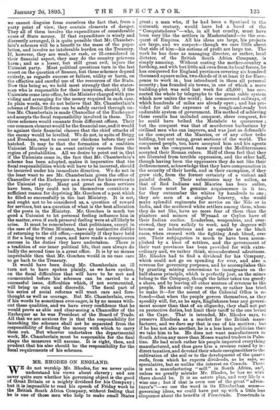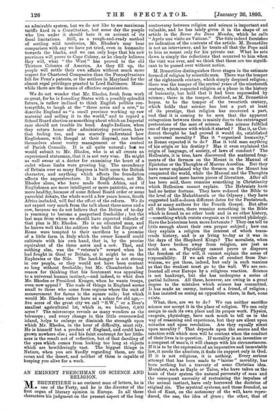MR. RHODES ON ENGLAND.
WE do not worship Mr. Rhodes, for we never quite understand his views about slavery ; and are never quite sure whether his governing object is the good of Great Britain or a mighty dividend for his Company ; but it is impossible to read his speech of Friday week to the British South Africa Company, without feeling that he is one of those men who help to make small States great ; a man who, if he had been a Spaniard in the sixteenth century, would have led a band of the " Conquistadores "—who, in all but cruelty, must have been very like the settlers in Mashonaland—to the con- quest of Empires. All his ideas are large, his projects are large, and we suspect—though we care little about that side of him—his notions of profit are large too. The work he has done as managing director, or rather, local dictator, of the British South Africa Company, is simply amazing. Without costing the mother-country a farthing, and with but little aid even from its local forces, he has conquered for England provinces covering six hundred thousand square miles, two-thirds of it at least fit for Euro- peans to work in ; has introduced in them all personal security ; has founded six towns, in one of which a mere building-plot was sold last week for £3,000 ; has con- nected the whole by telegraphs to the great cable system which now unites the world ; has commenced railways, of which hundreds of miles are already open ; and has pro- vided for all the expenses of a rough-and-ready but endurable system of government. His method of achieving these results has included conquest, sheer conquest, for he could have bribed the Matabele to quiescence ; but the conquest was that of murderous barbarians by civilised men who can improve, and was just as defensible as the conquest of the Maories, or of any other tribe holding, but not using, great sections of the world. The conquered people, too, have accepted him and his agents much as the conquered races round the Mediterranean accepted their Roman rulers. Half of them feel that they are liberated from terrible oppression, and the other half, though having been the oppressors they do not like their dethronement, acknowledge that they have compensation in the security of their herds, and in their exemption, if they grow rich, from the former certainty of a violent and painful death. Their submission may be sullen, as that of Red Indians and Maories has been sullen, but there must be genuine acquiescence in it too, for they outnumber the whites by hundreds to one ; they are men of a singular bravery, who would make splendid regiments for service on the Nile or in India, and the scattered white settlers among them, whom they do not like, have no more fear of them than the planters and miners of Wynaad or Ceylon have of their Indian coolies. Leaderless, weaponless, and over- crowed, they turn sulkily to work, and by degrees will become as industrious and as capable as the black races, when crossed with the fighting Arab blood, ever are. Their subjugation is much to have been accom- plished by a knot of settlers, and the government of their vast provinces has been provided for with extra- ordinary and, we rather think, misunderstood adroitness. Mr. Rhodes had to find a dividend for his Company, which could not go on spending for ever, and also a revenue for governing purposes, and he accomplishes this by granting mining concessions to immigrants on the half-shares principle, which is perfectly just, as the mines belong to the Company, though the latter takes too greedy a share, and by leaving all other sources of revenue to the people. He makes only one reserve, or rather has tried to make it—for the assent of the Colonial Office is re- fused—that when the people govern themselves, as they speedily will, for, as he says, Englishmen bear any govern- ment sooner than that of an oligarchy, they shall not put on protective duties, but limit their tariff to the one levied at the Cape. That is intended, Mr. Rhodes says, to preserve Rhodesia as a market for the British manu- facturer, and we dare say that is one of his motives ; but if he has not also another, he is a less keen politician than we take him to be. He does not want manufacturers in South Africa any more than Moses wanted traders in Pales- tine. He had much rather his people imported everything manufactured, and thus gave him a revenue raised by le- direct taxation, and devoted their whole energies either to the cultivation of the soil or to the development of the quart z reefs, from which he expects dividends, as he says, so speculative, but so unlike the interest on Consols. There is not a manufacturing "mill" in South Africa, ancl, unless we greatly mistake Mr. Rhodes, he has no wish there should be. It is an astute plan, and very likely a wise one ; but if that is even one of the great " adven- turer's "—we use the word in its Elizabethan sense— governing ideas, we could have put up with a little less eloquence about the benefits of Free-trade. Free-trade is an admirable system, but we do not like to see maximum tariffs fixed in a Constitution, lest some day the people who live under it should hate it on account of its fiscal limitations. Still, as a rough-and-ready method of settling wild territories, Mr. Rhodes's may bear comparison with any we have yet tried, even in humanity towards the blacks, and we can only hope that his new provinces will prove to Cape Colony, as he clearly believes they will, what " the West " has proved to the old Thirteen Colonies of America. As they fill up, the people will settle their own affairs without much more respect for Chartered Companies than the Pennsylvanians felt for Penn's patents, or the settlers in Maryland for the almost regal privileges granted to Lord Baltimore. Mean- while there are the means of effective organisation.
We do not wonder that Mr. Rhodes, fresh from work so great, for be is founding States with a possibly splendid future, is rather inclined to think English politics con- temptible, to laugh at the " three acres and a cow," to describe England as " a small province working up raw material and selling it to the world," and to regard a School Board election as something about which an Imperial race should not trouble its head. Anglo-Indians, when they return home after administering provinces, have that feeling too, and can scarcely understand how Englishmen, with Bengal at their disposal, can bother themselves about vestry management or the control of Parish Councils. It is all quite natural ; but we would submit to Mr. Rhodes, who is at all events an experienced statesman, that it is not very wise. He might as well swear at a doctor for examining the heart of a cadet whose limbs were growing big. The ascendency of Britain over so many Empires is built upon the British character, and anything which affects the foundation affects the superstructure. It is Englishmen, not Mr. Rhodes alone, who have made South Africa, and if Englishmen are more intelligent or more patriotic, or even more healthy, because of some School Board order or some parochial debate, the whole world a few years hence, South Africa included, will feel the effect of the reform. We do not expect very much from the talk about three acres and a cow, because we do not believe that the Briton of to-day is yearning to become a pauperised freeholder ; but the last man from whom we should have expected ridicule of that plan is Mr. Rhodes. He is an educated man, and he knows well that the soldiers who built the Empire of Rome were tempted to their sacrifices by a promise of a little farm in Italy which the owner himself could cultivate with his own hand, that is, by the precise equivalent of the three acres and a cow. That, and nothing else, was the " veteran's " reward when he had fought in Gaul or Britain, or it might be on the Euphrates or the Nile. The land-hunger is not strong in our people, or they would not have been content so long without freeholds ; but Mr. Chamberlain had reason for thinking that his lieutenant was appealing to a universal human instinct,—and indeed, to what does Mr. Rhodes or President Kruger, when he wants troops, even now appeal ? The scale of things in England seems small to those who come from regions where the unit of measurement for farms is the square mile; but which would Mr. Rhodes rather have as a solace for old age,— five acres of the great city we call " S.W.," or a Boer's smallest agricultural lot, which is, we believe, 6,400 acres ? The microscope reveals as many wonders as the telescope ; and every change in this little overcrowded island, helps to enlarge or diminish the strength upon which Mr. Rhodes, in the hour of difficulty, must rely. He is himself but a product of England, and could have grown nowhere else ; and his faint contempt for her little- ness is the result not of reflection, but of that dazzling of the eyes which comes from looking too long at objects which are bewilderingly vast. The biggest things in Nature, when you are fixedly regarding them, are the ocean and the desert, and neither of them is capable of keeping you alive for a week.



















































 Previous page
Previous page